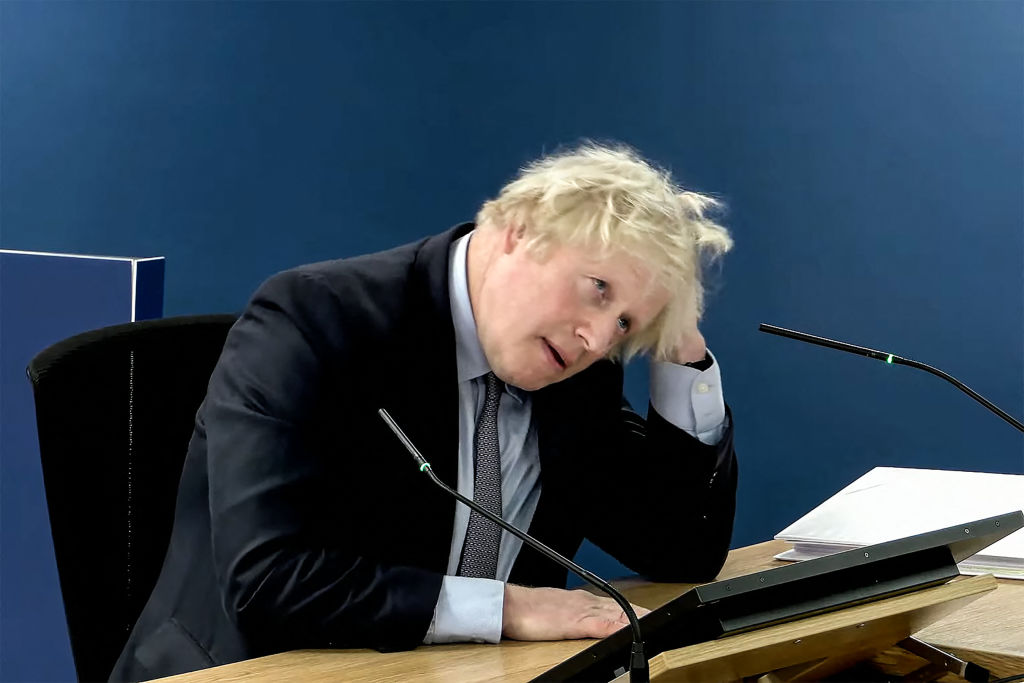It is hard to feel much in the way of sympathy for Boris Johnson, whose questionable leadership during the pandemic has come under renewed scrutiny during today’s much-anticipated appearance at the Covid Inquiry. Even so, Johnson made a valid point – too easily dismissed amidst all the guffawing and glee at the exposure of the derogatory comments in WhatsApp messages. He said that his government was no different from any other when it came to private feuding. Johnson suggested, under questioning from lead counsel Hugo Keith KC, that if WhatsApp messages were available from the Thatcher government showing what its members thought of each other, some of them would have been ‘pretty fruity’.
This came after Keith showed the inquiry more WhatsApp exchanges about the culture at No. 10, including one where Simon Case, the Cabinet Secretary, said he ‘had never seen a bunch of people less well equipped to run the country’. Another Case message claimed that ‘top-drawer people’ were refusing to work in Downing Street because of the atmosphere there. There was also a reference to a claim that talented people refused to work at No. 10 due to the ‘toxic culture’ – made in evidence to the inquiry by Helen MacNamara, the deputy cabinet secretary.
Johnson refused to accept that this showed there was friction at the heart of government, insisting that it would have been worse to have a culture where people were ‘deferential’ and ‘reluctant to make waves’. Not everyone will agree, of course, but that doesn’t make his interpretation wrong.
In truth, far too much weight has been placed during this inquiry on the somewhat absurd notion that government should be a harmonious working environment, where no one, from ministers down, is ever exasperated, frustrated or liable to blow up in colourful language. Where in Britain does this workplace utopia actually exist? What office, for example, could survive the public dissemination of what people say about some of their colleagues and their abilities or personal traits in personal WhatsApp messages?
Some argue that people have the right to expect higher personal standards of behaviour from those running the country. They certainly have the right to expect better but they should be prepared to be disappointed when they inevitably discover that ministers, senior civil servants and special advisers don’t always meet those standards. The reality is that under extreme stress people are likely to be critical of each other and say things that they may later regret. They are human beings, after all. Just as unprecedented is the release of so many private communications between people at the heart of government. Here too, Johnson has something useful to add, pointing out that there is a distinction between what is said, and what the government does, and adding that it is ‘not unusual for people in government to not like each other, but for them to get a lot done anyway’.
Recent political history backs up his argument. Thatcher’s 11-year tenure in Downing Street was a rollercoaster of ministerial infighting and resignations. Numerous political memoirs and history books cover the period in a calm and reflective way, alongside the inevitable settling of scores. What does not exist is a record of government by WhatsApp messaging, a minute-by-minute record of the frustrations and feuding of Downing Street life. One can only speculate what kind of messages would have been exchanged in the heat of the moment between Thatcher and her advisers at moments of high drama and political crisis, such as when Geoffrey Howe delivered his excoriating critique of her leadership style to a packed House of Commons, helping to trigger her eventual downfall.
Johnson was right too in suggesting that the Blair government got plenty done without everyone necessarily liking each other personally. The feud between Blair and his then chancellor Gordon Brown is a matter of public record: we can guess that might have played out by WhatsApp if it had existed back then.
No one should be surprised that Downing Street and Whitehall is filled with backstabbing, personal insults, and jockeying for power and influence at the expense of others. Boris Johnson’s government really was no different from any other, despite the many embarrassing WhatsApp messages. Where his comparison falls down is that his predecessors like Thatcher and Blair were much better at mastering the Whitehall machine, using its levers successfully, and more effective leaders of the country as a result.







Comments